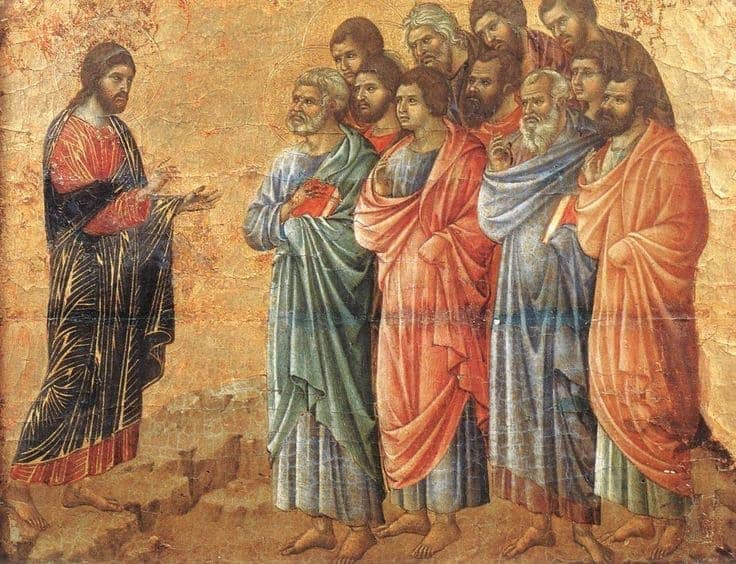 Gospel of 16 April 2020
Gospel of 16 April 2020
Thursday within the Octave of Easter
Luke 24:35-48
It is written that the Christ would suffer and on the third day rise from the dead
The disciples told their story of what had happened on the road and how they had recognised Jesus at the breaking of bread.
They were still talking about all this when Jesus himself stood among them and said to them, ‘Peace be with you!’ In a state of alarm and fright, they thought they were seeing a ghost. But he said, ‘Why are you so agitated, and why are these doubts rising in your hearts? Look at my hands and feet; yes, it is I indeed. Touch me and see for yourselves; a ghost has no flesh and bones as you can see I have.’ And as he said this he showed them his hands and feet. Their joy was so great that pthey still could not believe it, and they stood there dumbfounded; so he said to them, ‘Have you anything here to eat?’ And they offered him a piece of grilled fish, which he took and ate before their eyes.
Then he told them, ‘This is what I meant when I said, while I was still with you, that everything written about me in the Law of Moses, in the Prophets and in the Psalms has to be fulfilled.’ He then opened their minds to understand the scriptures, and he said to them, ‘So you see how it is written that the Christ would suffer and on the third day rise from the dead, and that, in his name, repentance for the forgiveness of sins would be preached to all the nations, beginning from Jerusalem. You are witnesses to this.’
Reflexion
Down through the centuries Christians have always confessed with the Apostles’ Creed: “I believe…in the resurrection of the body” or in some other translations, “the resurrection of the flesh.” This affirmation of faith in the resurrection is grounded on our faith in Christ’s resurrection. Our belief in the resurrection of the body would collapse if it was not tied to our fundamental belief in the bodily resurrection of Christ.
Yet the notion of the bodily resurrection of Christ has been the subject of controversies right from the very beginning. The problem in the resurrection isn't so much in agreeing that Jesus rose but in how He rose. It is very commonly accepted that the life of the human person continues in a spiritual fashion after death. But how can we believe that a dead body could rise to everlasting life? Sounds macabre! In spite of the historic church’s unwavering belief in the resurrection of the flesh, there are those then as there are those today who refuse to accept the bodily resurrection of Christ. The Romans discredited it, the Jews denied it and the Gnostics couldn’t stomach it.
Greek philosophy in general commonly distinguished between two worlds, the world of the spirit and the world of matter. The world of the spirit is considered superior and more perfect than the material world. According to this view, our live’s goal must be to free the spirit from the prison of our physical bodies.
But Christianity rejects this view because God is the creator of both the visible and the invisible, the spiritual and material realities. And because God is the author of both realities, salvation cannot just be confined to the spiritual but must also include the physical. So if we deny the bodily resurrection of Christ we also deny the resurrection. St Paul said in 1 Cor. 15:14, “and if Christ has not been raised, then our preaching is vain, your faith also is vain… and if Christ has not been raised, your faith is worthless; you are still in your sins.” To deny the resurrection of Jesus is to deny the heart of Christianity itself.
That is why today’s gospel text makes this important point. Jesus invites his disciples to “touch” and “see” for themselves, so that they will be certain that he is not a ghostly apparition because “a ghost has no flesh and bones.” The body that emerged from the tomb on Easter morning was seen (Matt. 28:17), heard (John 20:15-16), and even touched (Matt. 28:9) on many occasions after the Resurrection. To stress the point further, he asked for something to eat. Jesus is not a dead man’s ghost. He is truly alive.
The point of the resurrection is the final defeat of sin, death, and the grave. And, to do that, you must have a body that crosses over the threshold of death, but then returns victorious. In other words, for God to prove that He has defeated death, He has to have a body to show for it - a living body. And because He has defeated death, we know that those who have died before us will rise to eternal life.
